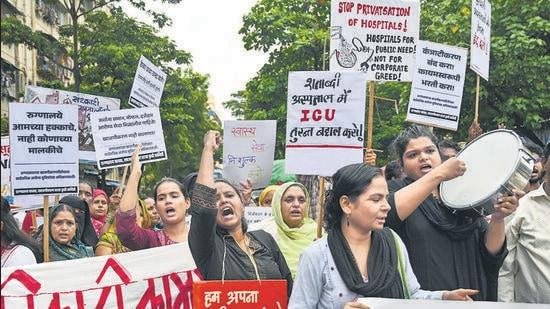Shubham Kothari, Aspatal Bachao, Nijikaran Hatao Kriti Samiti
This report was first published by Jan Swasthya Abhiyan (JSA) on their website
(Please see the note at the end to know about JSA)
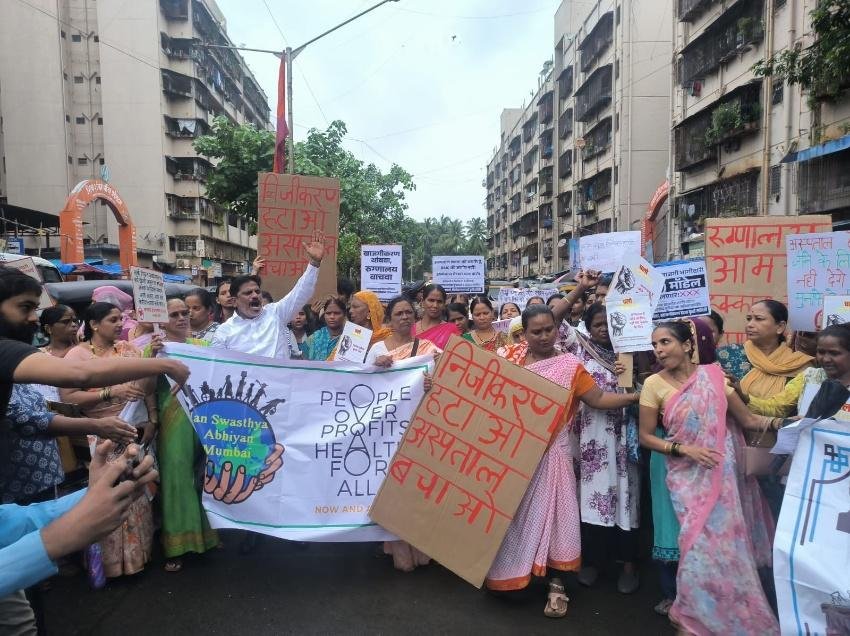
Swasthya hai sabka adhikar! Band karo iska vyapar!
(Health is everyone’s right – stop its commercialisation!)
Aspatal hai jeene ke liye – Nahi denge munafe ke liye!
(Hospitals are for saving lives – we will not give these for making profits!)
Rugnalay aamchya hakkache – Nahi kunachya maalkiche!
(Hospitals are our right – not anyone’s private property!)
These were some of the many slogans raised during the demonstration held on July 7, 2024, when over 300 residents of Mankhurd-Govandi areas in Mumbai organised a rally and staged a powerful protest outside the M-East Ward office. Their collective demand was clear: halt the privatization of Shatabdi Hospital and Lallubhai Compound Super-Speciality Hospital. Organised by a coalition of over 25 organisations who have come together under the banner of “Aspatal Bachao, Nijikaran Hatao Kriti Samiti” (Save our Hospitals, Scrap Privatization action committee), this mobilization marks the launching of a struggle to defend public healthcare in Mumbai from growing corporate takeover. This was a powerful, grassroots rejection of the Brihanmumbai Municipal Corporation (BMC)’s proposal to hand over key public hospitals to private players, which is being framed under the deeply problematic Public-Private Partnership (PPP) model.
At the centre of the storm are two crucial public hospitals: the Shatabdi Municipal General Hospital, Govandi and the Lallubhai Compound Hospital, Mankhurd. Both would serve people in the M-East Ward—an area that most starkly reflects the obscene health and social inequities in the ‘Maximum city’ of Mumbai. This ward accounts for just 6.7% of the city’s population, but has over 16% of maternal deaths. TB cases have surged by a staggering 300% over a decade. Malnourishment is rampant, with more than 50% of children suffering from stunting and wasting. Asthma and respiratory illnesses are very common, thanks to the toxic Deonar dumping ground and the SMS Biomedical waste plant operating nearby.
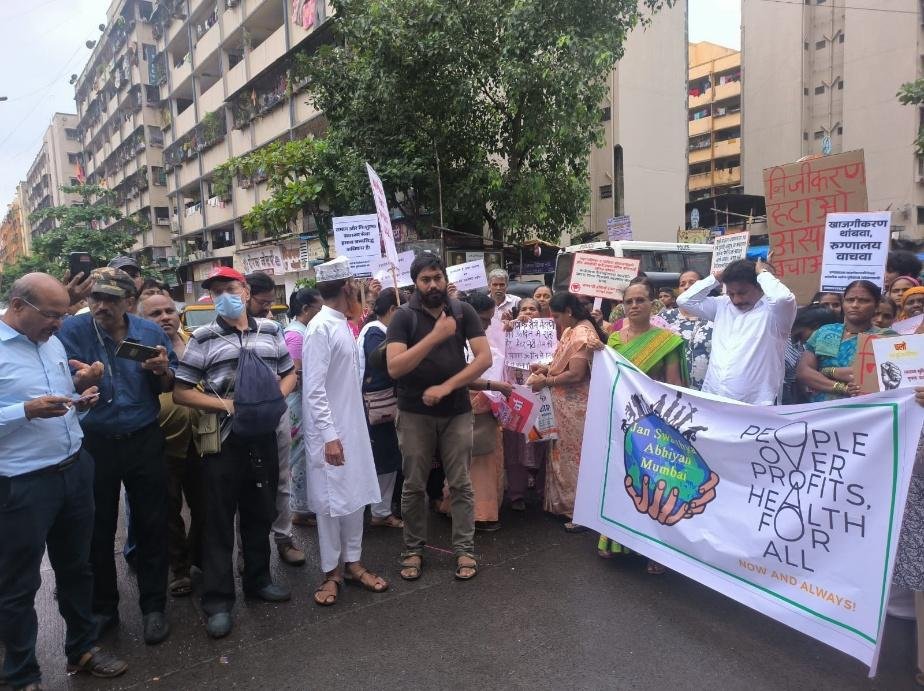
This is a ward where the vast majority of people live in slums, where daily-wage work is widespread and precarious, and affording even two square meals is a daily struggle for many working people. In such a context, the availability of properly functioning, well-staffed public hospitals providing free care is a crucial lifeline, often forming the only line of defence which stands between illness and destitution for lakhs of people. And yet instead of strengthening these public institutions, the BMC is aggressively pushing for their privatisation and commercialisation. BMC has already operationalised 20 PPPs of various kinds in the health sector in Mumbai during last several years, whereby private actors are handed over control of public health services under the guise of “PPP”, allowing them to operate, manage, and extract profit from public hospitals which have been built with precious taxpayer money.
A manufactured crisis
BMC’s privatisation strategy appears to proceed in two stages – firstly, deprive existing public hospitals of essential staff, resources and proper management, and create an environment that these are not functioning well. And next, hand over existing as well as newly constructed public hospitals to private operators in PPP mode, under the pretext that only commercial players can properly deliver public services. Exemplifying the first stage is the continuation of massive staff vacancies in Shatabdi hospital (31% posts vacant) and Deonar Maternity Hospital (46% posts vacant), while the overall level of staff vacancies in BMC hospitals is 36%. These glaring gaps persist despite the fact that Mumbai Metropolitan Region has around a dozen medical colleges which produce over 2000 MBBS doctors annually, and huge numbers of healthcare professionals are available who would willingly work in the public system if provided regular employment. Instead of robust recruitment, expansion of infrastructure, and scaling up of public services in keeping with population needs, we see that BMC (acting in collusion with powerful private interests) has manufactured a chronic crisis to justify the next step of privatisation. In effect, there is orchestrated neglect to undermine the public sense of ownership for these hospitals, which becomes the prelude to formally transferring their management to commercial operators. The public system is made to falter, so the private sector can then be invited in to ‘save’ it—at a heavy price that patients and society can definitely not afford.
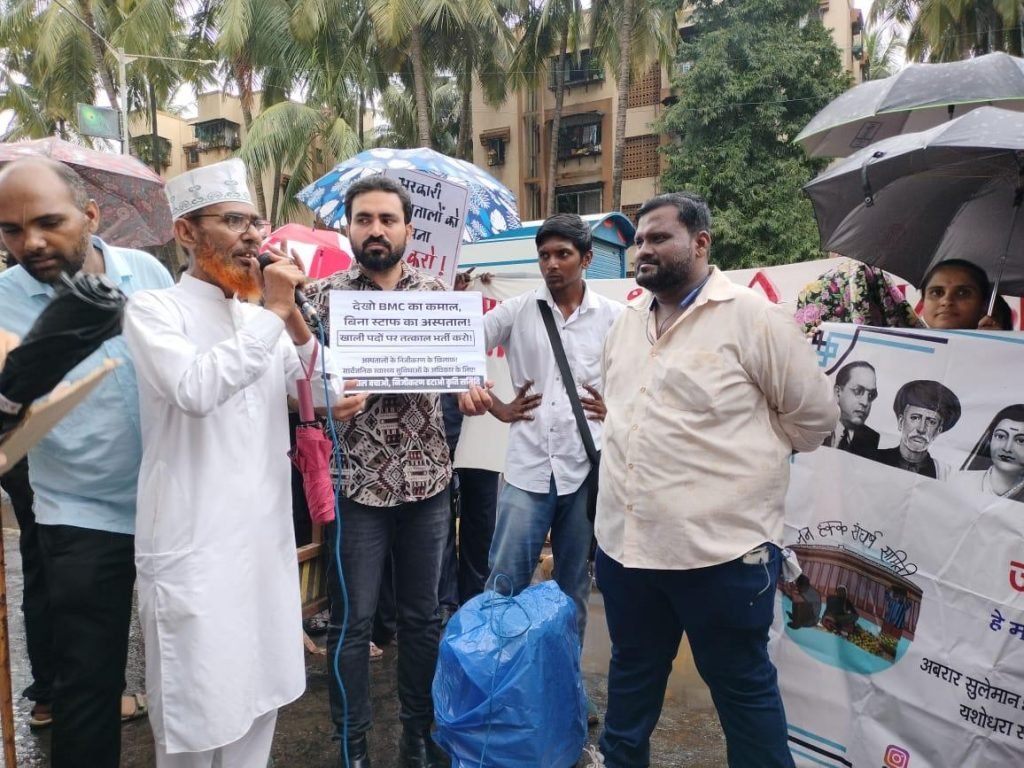
People are fighting back
The residents of Govandi and Mankhurd are now standing up and refusing to accept this dismantling of public healthcare, while demanding major improvements in health services. The ‘Save Hospitals, Scrap Privatisation’ action committee brings together a diverse range of around 25 locally grounded organisations including resident’s groups, trade unions, health activists from Jan Swasthya Abhiyan – Mumbai and various NGOs, progressive political organisations, and associations of municipal healthcare staff.
The campaign organized a protest march against the degradation of hospital facilities and privatisation of its services on 7th July, with demonstrators marching to the Municipal ward office in M-East ward. The rally included speakers from various slum colonies and residents of the ward, who spoke about their complete dependence on public healthcare facilities, and the current dire condition of services. Speakers highlighted the gross negligence of public health services by BMC, leading to life threatening and appalling conditions in public health facilities. Activists also stated that this privatisation is a continuation of the ongoing attacks on other public services and welfare like education, public transport, electricity, scholarships and various government subsidies. The organizers of the rally pointed out the fear amongst women regarding this attempt towards privatisation, since their meagre access to resources make them completely reliant on public health services.
Key demands of the campaign
The campaign has raised six major demands which have been presented to the BMC authorities as well as State health officials –
- Shatabdi and Lallubhai Compound Hospitals—as well as any other government hospital in Mumbai—must be immediately and completely excluded from any privatization process, including the Public-Private Partnership (PPP) model.
- NICUs (Neonatal Intensive Care Units) must be promptly made operational in all maternity hospitals in the M-East Ward, linked with promptly completing recruitment for all vacant posts. The Maharashtra Nagar Maternity Home must be reopened without delay.
- Advertisements for all vacant posts in hospitals and health centres must be published within 30 days, and recruitment must be completed within 3 months.
- Free diagnostic laboratory services must be launched in all government hospitals within 30 days.
- All vacant posts in municipal dispensaries must be filled immediately, and 38 new dispensaries must be established within the next 3 months, to meet the norm of one dispensary per 15,000 residents.
- Monthly public review meetings must be held at the ward office in the presence of responsible Municipal Corporation health officials, to regularly address public grievances and review improvements in health services.
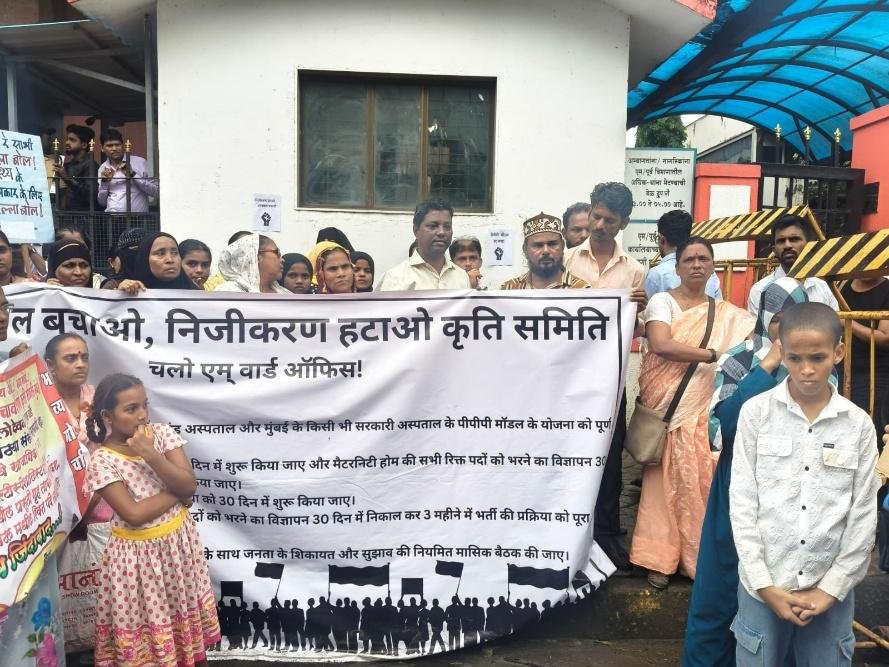
Although the action committee had provided notice of the demonstration well in advance, on the day of the rally BMC did not ensure the presence of any responsible official at the ward office to discuss matters with the delegation. The delegation members strongly registered that this attitude displayed by BMC officials appeared to be of indifference or complete submission to the idea of privatisation of health services. After an hour of discussion, the only assurance provided by the Medical Health Officer of the ward was of organising another meeting with higher officials, for which a written communication was given. While this lack of proper response from officials was disappointing, the residents are now preparing for intensified protests and widening their movement for defence of public healthcare services.
Building solidarity and taking forward the struggle
As the struggle gathers momentum, it is vital that various social organisations from across Mumbai join hands to strengthen the movement, while broader solidarity is also demonstrated. Already Jan Arogya Abhiyan (JSA Maharashtra) has adopted a resolution to support this struggle, which is significant for the entire state. Such broader mobilisation is essential because the political and commercial interests pushing for privatisation of healthcare in Mumbai are very powerful, and are unlikely to withdraw their anti-people decisions without a sustained and large scale movement. Of course the privatisation-oriented policy landscape in Mumbai is not an isolated instance, rather health sector privatisation, and outsourcing or asset transfer type PPPs are being aggressively promoted in the health sector across India. This is despite mounting evidence that such PPPs lead to much higher out-of-pocket costs, exclusion of the poor, compromised quality of services, and fragmentation of already weak social accountability.
About JSA
The Jan Swasthya Abhiyan (JSA) was formed in 2001, with the coming together of 18 national networks that had organised activities across the country in 2000, in the lead up to the First Global Peoples Health Assembly, in Dhaka, in December 2000. The JSA forms the Indian regional circle of the global People’s Health Movement (PHM).
The JSA, today, is constituted of by 21 national networks and organisations and state level JSA platforms which are present in almost all states in the country.
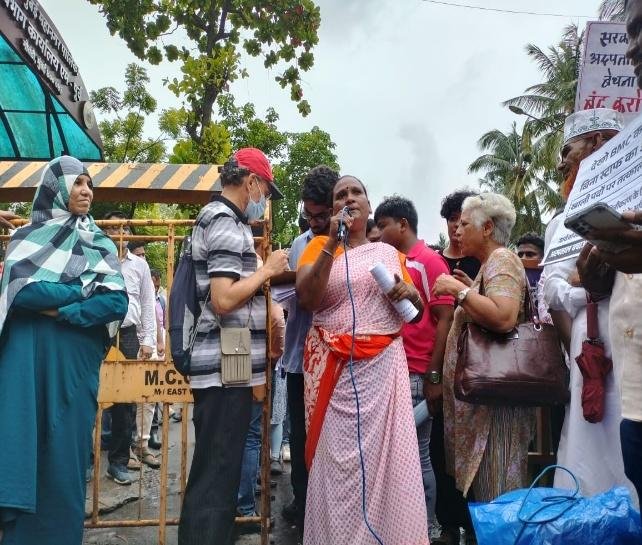
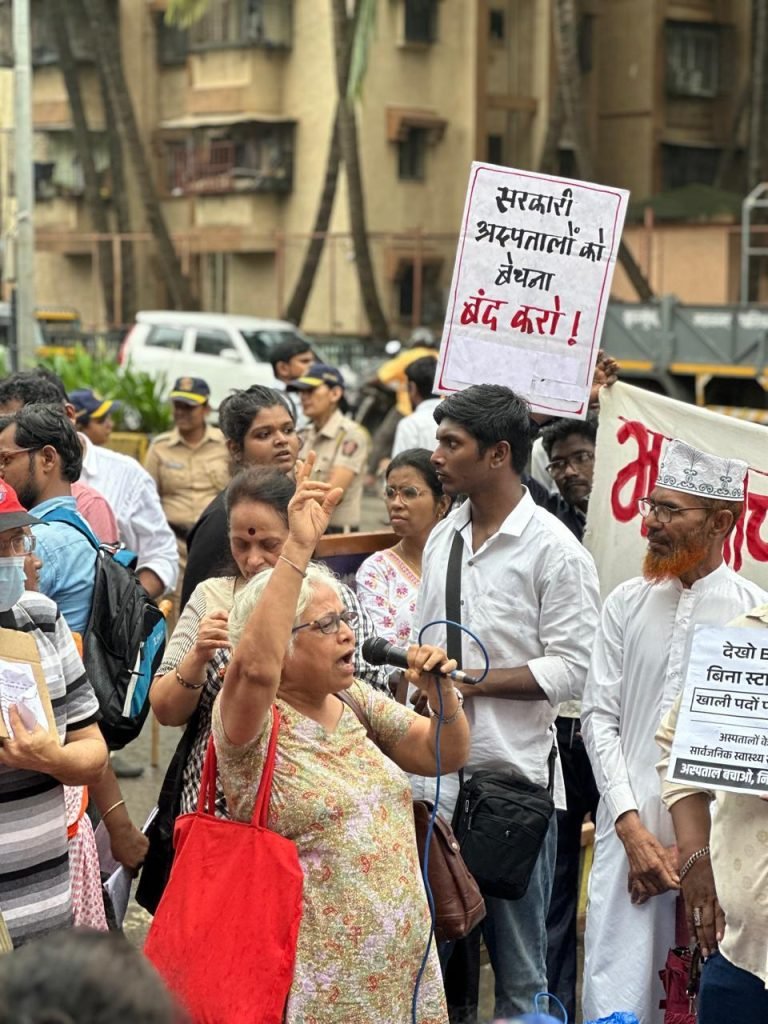
The residents of the area are now preparing for a month of campaigning in various slum pockets, while expanding the samiti through alliances to cover all of Mumbai. The organizers of the protest also announced that within one month a Jan Sunwai will be organised in front of the ward office, where issues of public healthcare facilities and various demands to improve their services will be publicly raised and discussed in detail.
The popular fightback from Govandi-Mankhurd shows that people are refusing to be passive victims—despite the odds stacked against them, they are getting organised, informed, and ready to resist and reclaim public health services, which are their basic right. What we are witnessing in Mumbai is not just a fight for saving two public hospitals. It is an important emerging front in the growing nationwide movement to save the future of our health system.a
(This article is based on the collective movement and draws upon the press release and other documents of ‘Aspatal Bachao, Nijikaran Hatao’ Kriti Samiti. Drafting and editing inputs have been contributed by Abhay Shukla)
